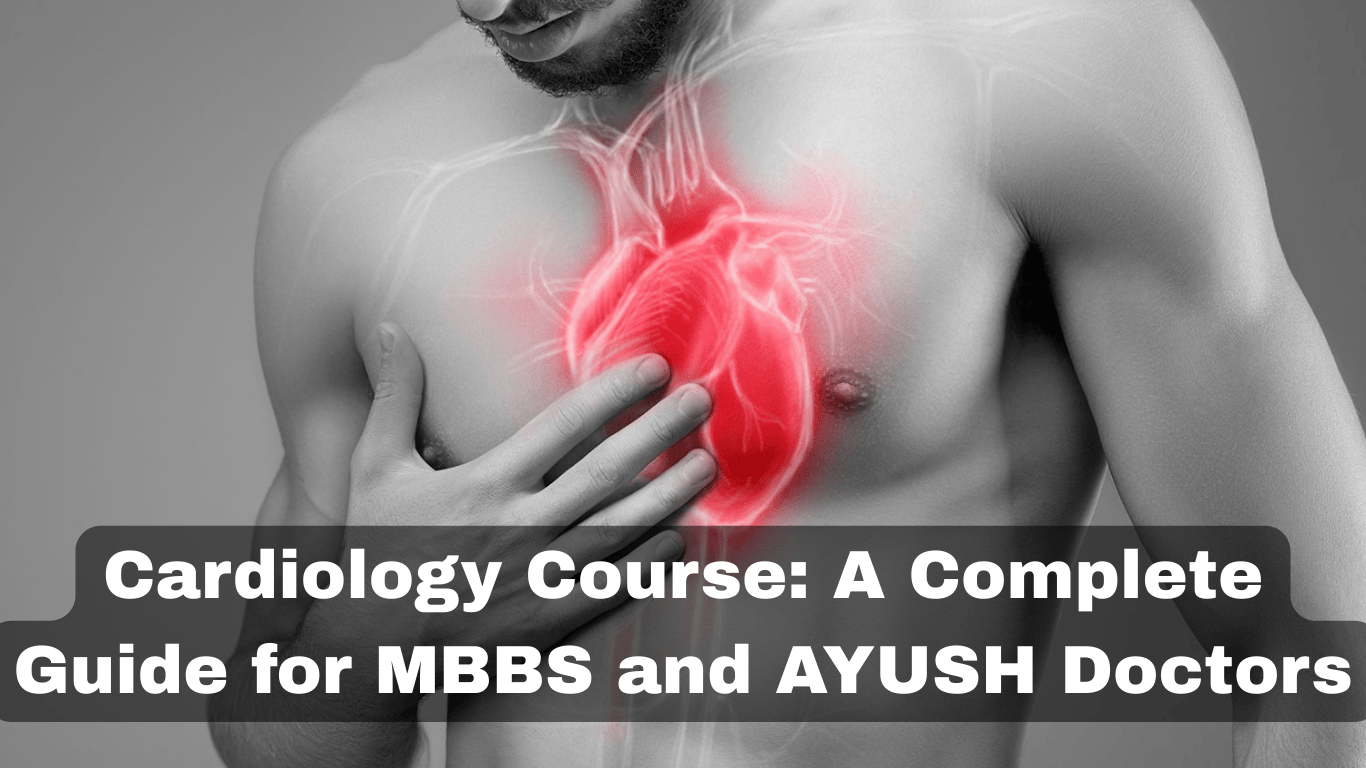There are no items in your cart
Add More
Add More
| Item Details | Price | ||
|---|---|---|---|

Heart disease continues to be one of the leading global health concerns, which has significantly increased the demand for doctors trained in cardiology. Whether you are an MBBS graduate, an AYUSH practitioner, or a working physician, enrolling in a cardiology course can help you upgrade your cardiac knowledge, improve diagnostic accuracy, and grow your medical career.
With the availability of flexible online learning platforms, doctors can now access high-quality courses in cardiology without interrupting their clinical practice. These programs offer structured training, expert-led modules, and recognized certification — making cardiology specialization more accessible than ever.
1. Rising Cardiac Cases
Cardiovascular diseases are increasing rapidly, especially in India. A structured cardiology course helps doctors stay prepared to handle common and complex cardiac conditions.
2. Updated Clinical Expertise
Medical science evolves constantly. Modern courses in cardiology ensure doctors stay updated on:
· ECG interpretation
· Coronary artery disease
· Heart failure
· Arrhythmias
· Hypertension
· Cardiac emergencies
3. Improved Career Growth
A certified cardiology course enhances your professional profile and opens doors to specialized roles in hospitals, clinics, emergency units, and telemedicine.
4. Flexible Learning Options
Online cardiology programs allow doctors to study anytime, from anywhere — perfect for busy professionals.
Below are the best courses in cardiology that doctors can choose based on their goals:
1. Certificate in Clinical Cardiology (3-Month Program)
A short-term cardiology course designed for fast upskilling.
What You Learn:
· Basic cardiac evaluation
· ECG reading
· Hypertension & heart failure basics
· Risk assessment
Ideal For: MBBS/AYUSH doctors needing quick skill enhancementDoctors preparing for advanced cardiology programs
2. Fellowship in Clinical Cardiology (12-Month Program)
A comprehensive one-year cardiology course offering advanced clinical training.
What You Learn:
· Advanced ECG
· Coronary artery disease
· Heart failure management
· Cardiac emergencies
· Basic cardiac imaging
Ideal For: Doctors aiming for specializationPhysicians wanting deeper cardiology expertise
3. Pediatric Cardiology Fellowship
A specialized cardiology course focused on children with congenital and acquired heart diseases.
Includes:
Pediatric echocardiography
Congenital heart diseases
Neonatal cardiac management
4. PGD in Cardiology (Post Graduate Diploma in Cardiology)
A diploma-level cardiology course that teaches adult cardiac management, diagnostics, and clinical decision-making.
Covers:
· CAD
· Arrhythmias
· Heart failure
· Cardiac pharmacology
· Cardiac imaging
5. CME in Cardiology (Short-Term Programs)
Quick, focused courses in cardiology designed to update doctors on:
· New treatment guidelines
· Emergency protocols
· Interventional cardiology updates
1. Better Clinical Confidence Doctors trained through a cardiology course can diagnose cardiac conditions with greater accuracy.
2. Higher Patient Trust Patients prefer certified specialists for heart-related conditions.
3. Global Career Opportunities Many certifications in cardiology follow international guidelines.
4. Stronger Medical Practice From OPD to emergency units, cardiac skills are valuable everywhere.
How to Choose the Right Cardiology Course
Look for:
· Accreditation
· Updated curriculum
· Experienced faculty
· Flexibility of schedule
· Recognition of certification
Choose a cardiology course that aligns with your career goals and daily responsibilities.
A cardiology course is one of the best investments a doctor can make in today’s healthcare landscape. With the rise of cardiac cases and the need for specialized care, doctors trained in cardiology stand out as trusted, skilled, and future-ready professionals.
Whether you choose a short-term certificate, a 12-month fellowship, or a diploma program, modern courses in cardiology offer the flexibility, depth, and certification needed to grow your career and deliver better patient outcomes.
